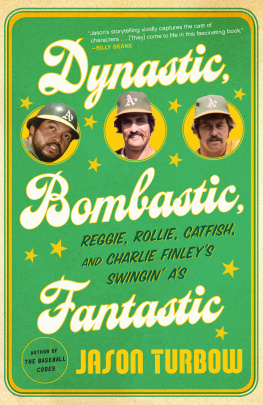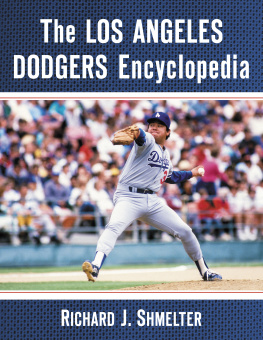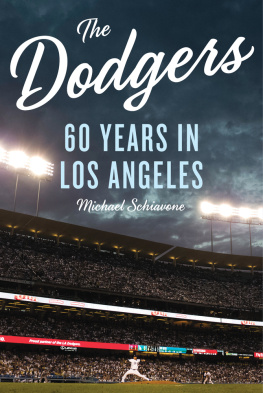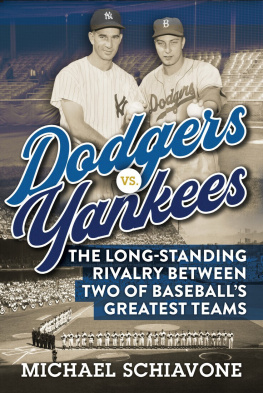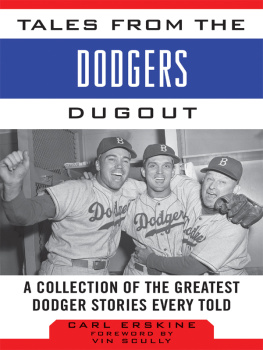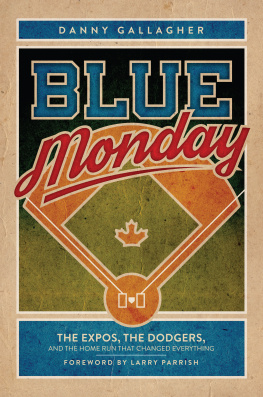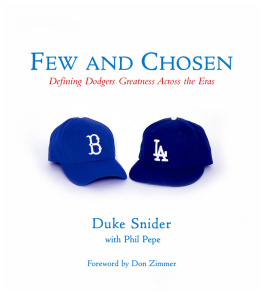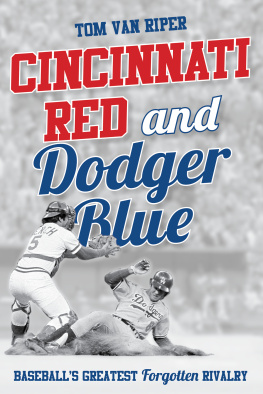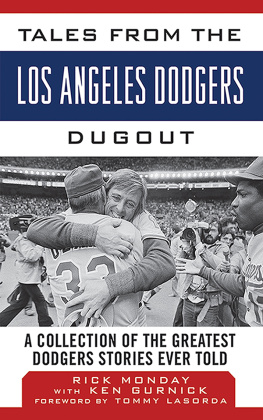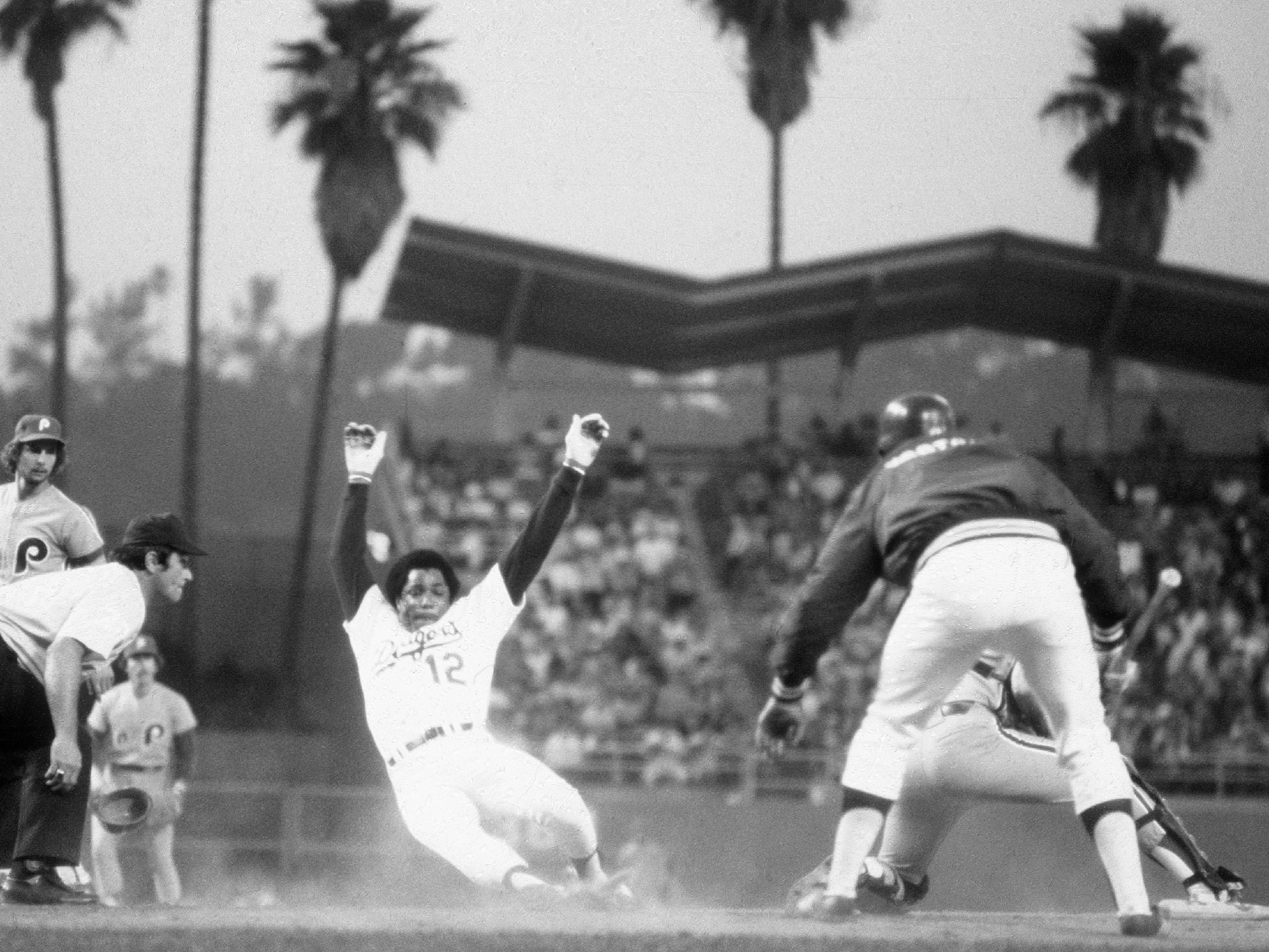Copyright 2019 by Jason Turbow
All rights reserved
For information about permission to reproduce selections from this book, write to or to Permissions, Houghton Mifflin Harcourt Publishing Company, 3 Park Avenue, 19th Floor, New York, New York 10016.
hmhbooks.com
Library of Congress Cataloging-in-Publication Data
Names: Turbow, Jason, author.
Title: They bled blue : Fernandomania, strike-season mayhem, and the weirdest championship baseball had ever seen: the 1981
Los Angeles Dodgers / Jason Turbow.
Description: Boston : Houghton Mifflin Harcourt, [2019] | Includes bibliographical references and index.
Identifiers: LCCN 2018043599 (print) | LCCN 2018051094 (ebook) | ISBN 9781328715579 (ebook) | ISBN 9781328715531 (hardback)
Subjects: LCSH : Los Angeles Dodgers (Baseball team)History20th century. | Valenzuela, Fernando, 1960 | Pitchers (Baseball)MexicoBiography. | Lasorda, Tommy. | Baseball managersUnited StatesBiography. | World Series (Baseball) (1981) | BISAC : SPORTS & RECREATION / Baseball / History. | SPORTS & RECREATION / Baseball / General. | SPORTS & RECREATION / Baseball / Essays & Writings. | HISTORY / United States / State & Local / West (AK, CA, CO, HI, ID, MT, NV, UT, WY). | HISTORY / United States / 21st Century.
Classification: LCC GV 875. L 6 (ebook) | LCC GV 875. L 6 T 87 2019 (print) | DDC 796.357/640979494dc23
LC record available at https://lccn.loc.gov/2018043599
from Focus on Sport/Getty Images
from Wally Fong/AP/Shutterstock
Cover design by Brian Moore
Cover photograph Heinz Kluetmeier / Sports Illustrated / Getty Images
Author photograph Laura Turbow Photography
v2.0719
To the girl who came up with the title
Prologue
T HEY HAD THE 1978 World Series all but wrapped up there in New York, the Dodgers did, their best team since the Boys of Summer standing poised to snatch a three-games-to-one lead over the vaunted and long-despised Yankees. Decades on, LA players would continue to insist that the title was as good as theirs, right up to the moment when Reggie Jackson literally hip-checked their destiny into foul territory down the first-base line.
The moment in question arrived in the sixth inning of Game 4, with the Dodgers leading the Series, two games to one, and the game, 30, on a home run by their own Reggie, outfielder Reggie Smith. Then Dodgers starter Tommy John put runners on first and second with one out, courtesy of a soft four-hopper just beyond the reach of shortstop Bill Russell, and a walk. The Yankees had barely even hit the ball but suddenly were cookingmost of all because this brought Jackson, Mr. October, to the plate as the tying run. Reggie bore an unmistakable swagger, his top two jersey buttons undone, the sleeves of his black undershirt meeting white sweatbands at his wrists, those trademark wire-rimmed glasses perched atop his nose. Had wire-rimmed glasses ever been so intimidating? A year earlier, Jackson had cemented his postseason-hero status with an all-time epic World Series performance, also against LA, with three homers over the span of three pitches in the deciding Game 6, spurring his team on to victory and himself onto a candy wrapper.
Even and still, Jackson or no, the 1978 Dodgers were in terrific position to handle whatever an unloving world might throw their way. Their pitchers led the National League in victories and ERA, finished second in complete games and WHIP, third in shutouts, and fourth in saves. Their hitters led the league in batting average, home runs, runs scored, on-base percentage, and slugging average, had stolen more bases than the league average, and were caught less. The Dodgers had placed six players in the All-Star Game, which the National League subsequently won. It was a better collection of talent, said many members of the team, than either of LAs 1974 or 1977 World Series clubs. Now the Dodgers led Game 4 by a trio of runs, and the primary thing standing between themselves and a short route to a championship parade was the guy they least wanted to see. Jackson stood in the left-handed batters box, glaring at the pitcher. This was prime-time baseball, Reggies favorite time.
Even superstars cant homer every at-bat, of course. This time Jackson came through by merely singling in New Yorks first run, a feat producing less overt drama than his homer barrage of 1977, but, starting only moments later, more enduring agita for those in the opposing dugout. Reggies hit advanced Thurman Munson to second and, having closed New Yorks deficit to 31, brought Lou Piniella to the plate.
The right fielder promptly tapped a humpbacked liner up the middle, which Russell, moving to his left, reached in plenty of time for the putout. The shortstop, howeverwhose nervous glove had long belied his supreme athleticismwas coming off a season in which hed finished third in the National League in errors. He nearly made another one here, the ball clanking off his mitt, a miscue that looked inconsequential when it rolled directly toward second base, allowing Russell to snatch it up three steps from the bag and race over to force Jackson for the innings second out... which is where things got interesting.
With Russell having been in position to catch the ball on the fly, both runners had retreated to their bases of origin. Munson, in fact, made such a belated start toward third that had the shortstop thought to reach to his right upon gathering in the loose baseball, he might well have been able to tag him then and there. Russell didnt, of course, because there was no need: an accurate relay to first basewhich the shortstop provided, firing a bullet to Steve Garvey in plenty of time to retire Piniellawould complete an inning-ending double-play. There was, however, an impediment: Jackson, having backtracked, was rooted in the baseline only steps away from first. As the throw rocketed toward its intended target, Reggie did the only thing he could to extend the inninghe leaned ever so slightly toward right field, his hip jutting out just far enough to deflect the throw, which bounced off him and toward the grandstand alongside the Yankees dugout, allowing Munson to score.
The Dodgers screamed interference. Manager Tommy Lasorda speed-waddled onto the field, tobacco juice dribbling onto his chin as he argued at top volume with umpires Frank Pulli and Joe Brinkman. Pulli, stationed at first, later admitted that his view of the base runner had been obstructed and that he had little idea whether Jackson might have intentionally interfered with the ball. Brinkman said that hed been looking at second base to call the force-out when the ball hit Reggie... or, depending on your rooting interests, when Reggie hit the ball.
The play might have been dirty, but theres no denying that it was smart. Had Jackson done nothing, the inning would have been over. The frame would similarly have ended had Reggie been called for interference, as he should have been. As it was, though, he got away with it, allowing Munson to close New Yorks deficit to 32, The Sporting News later calling it one of the shrewdest and most significant plays in World Series history. Had Jackson not done what he did, pitcher Tommy Johnwhose previous two starts were a four-hit shutout over Philadelphia in the National League Championship Series and LAs victory over the Yankees in the first game of the World Serieswould have been in the middle of another four-hitter, trying to protect a two-run lead in the late innings. Instead, with the Dodgers clinging to a one-run advantage, Lasorda pulled the left-hander after Paul Blairs leadoff single in the eighth. Two batters later, reliever Terry Forster allowed a game-tying double to Munson, and the game went to extra innings. New York won it in the 10th, and the Dodgers, instead of being one win from a Series victory, found things knotted at two games apiece. It wrecked them.

